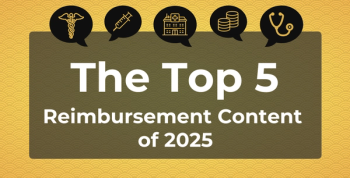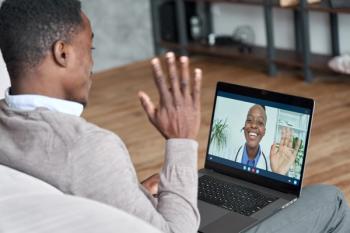
- December 2020
- Volume 26
- Issue 10
Reimagining Cancer Care Delivery—and Serving Employers—Through Access Hope

In an interview with Evidence-Based Oncology™, City of Hope's Harlan Levine discussed the rising interest of employers in cancer care and how AccessHope can help them deliver better care where their employees live.
In the United States, employers are the top source of health insurance, accounting for nearly half (49.6%) of the coverage in 2019, according to the Kaiser Family Foundation.1 As job-based health care costs have climbed more than 50% over the past decade,2 it makes sense that employers are scrutinizing these costs. But employers are doing more than just looking at the spending: They want to know their health care dollars are being spent in ways that make a difference for employees.
Among the conditions covered by employer-funded insurance, cancer stands out. Today’s treatment options can exceed $1 million per patient if successive therapies are used, and cancer accounts for 12% of employer medical spending and 12% of time away from work.3
Leaders from City of Hope, a National Cancer Institute–designated research and treatment center in Duarte, California, say employers tell them that beyond these costs, a cancer diagnosis can have ripple effects across a team; thus, the quality of care affects more than just the patient. Last fall, City of Hope responded to employers’ desire to deliver better cancer care by creating AccessHope, a wholly owned subsidiary. City of Hope has invested $40 million in AccessHope’s program of cancer support, designed to connect expertise from National Cancer Institute–designated centers with patients and their local oncologists—in their own communities.
AccessHope has created an organized set of services that employers can use to connect their employees and their oncologists with cutting-edge insights and clinical trials. “Best practices in oncology are evolving at an extraordinary pace, and the health plans and delivery system need support to ensure that all patients have consistent access to the most current data and best treatments,” Harlan Levine, MD, president of Strategy and Business Ventures at City of Hope and AccessHope chair of the board, said during the launch.4 “By leveraging the knowledge that comes from precision medicine and clinical research, our aim is to address disparities in health outcomes and optimize a patient’s opportunity for survival.”
Levine said that more than 80% of cases engaged through AccessHope are affected by the decision support opportunities or other assistance. The program is also helping employers save money. One AccessHope service, Accountable Precision Oncology, can return more than $3 in value for every $1 spent by the employer when the recommendations that AccessHope provides are adopted.
In an interview with Evidence-Based Oncology™, Levine discussed the rising interest of employers in cancer care and how AccessHope can help them deliver better care where their employees live.
This interview has been edited for clarity.
Evidence-Based Oncology™ (EBO): Can you describe the evolution of the employer interest in cancer care?
Levine: It’s been progressively evolving since World War II, when employers first became interested in health benefits. For decades afterward, employers have been driving much of the innovation in health management.
In support of that, and in support of the health and welfare of the workforce, more recently you’ve seen employers get involved in direct care. They’ve gone into onsite clinics, they’re doing direct contracting with providers, and they’re engaging with health care navigators to help their employees directly.
The interest in cancer care is natural. Human resources (HR) directors are seeing cancer in the news all the time: the new discoveries, new therapeutics, and lives saved in [new] ways. But it’s also in the news because they’re reading about disparities in cancer care, where outcomes are really driven by social determinants of health and access to expertise. I feel that employers are more aware of this than ever, and they want to connect their employees to the right experience in cancer care. [As a result,] their HR directors recognize that the current solutions, such as utilization management and narrow networks, aren’t doing the trick. They’re looking for something better to help their employees and their family members with cancer.
Of course, the other driver is the rising cost of cancer care, given all the new and targeted therapies. It’s natural that employers want to make sure that these are all being used effectively. From an HR and a health management point of view, [only a] small group of employees—typically, 1% to 2% of a workforce—will have active cancer in a year. But if it’s driving 12% to 14% of your expenses, and increasing over time, and you see the variability in the outcome and the quality, it’s just a natural place to want to focus your attention. So, for all those reasons, you’re seeing increasing interest in cancer care on the part of employers.
EBO: As employers are taking that more active role, are they also trying to make sure their employees have a better experience when they are treated for cancer?
Levine: I think they are. They’re getting very active and making sure their employees have access to better care. For years, cancer was a third-rail topic: You didn’t want to interfere with the doctor-patient relationship, and you didn’t want to be heavy-handed in utilization management. So, for years, there was [little] focus on this. But the data and the reality of the day have changed things: HR leaders are seeing the variable outcomes based on demographics that include zip code and race.
And that’s where this fi eld is changing fast. Medical oncologists themselves report the challenges of keeping current with precision medicine. And cancer is very different from other conditions. For example, guidelines and care are very well ensconced for conditions [such as] back pain and diabetes. In cancer, you have several challenges. One is that the guidelines are very broad. So, the guidelines can tell you what’s acceptable, but they don’t tell you what’s optimal. And the fi eld is changing so fast that published guidelines are often lagging behind the best science. In fact, I would say that unlike most chronic conditions, where the gap between usual care and optimal care is actually narrowing over time, in cancer, given how fast things are progressing, I think you’re seeing a widening of the gap between usual care and optimal care.
Employers are trying to bridge that gap. The proof is in the market experience: In AccessHope, we serve 1.95 million members through 34 employer partnerships. These include eleven Fortune 500 companies; we’re adding more in 2021. We also have partnerships with third-party administrators (TPAs) and a large regional health plan. And with our employer consortium and many more ongoing discussions, it’s clear that this interest is going to continue.
I’ve been a health care administrator for 25 years. During that time, when executives from every sector of health care, and many outside health care, have come to me for support when there’s a cancer issue, they never say, “Tell me the establishment that has the best published guidelines.” They always say, “Help me find the institution that has the best experience and the best expertise and can give the patient the best experience and best outcome.” [In short,] employers now want to deliver what they’ve always wanted for themselves and their loved ones. They want to deliver it to their employee base, and [they want] solutions like AccessHope that can deliver it both affordably and at scale. For all those reasons, you’ll see employers take an even more active role going forward.
EBO: When an employee has a bad experience with cancer care, how does that affect the rest of the staff?
Levine: Well, employers tell me that cancer—more than other conditions—really impacts the entire work unit. In a recent survey, we found that far more than half of adults have been touched by cancer—meaning someone in their family or their close circle of friends—and more than half have experienced the death of someone from cancer. So, when [the experience] is negative, it tends to be a topic of discussion around the workplace. [Plus,] negative experiences will lead to time away from work or presenteeism. When a person [in the workplace] has cancer, everyone rallies and supports them in it, which is wonderful for the person, but it’s a distraction. And then if the [cancer care represents] a bad experience, that often translates into people believing it’s due to benefit design, so that can often impact morale and engagement.
Employers are very aware of this, and there’s a lot they can do. And there’s a lot that they are doing. First, they recognize that having cancer is a shock to the system. They help people find their bearings by offering navigation programs. Also, more than ever, employers are creating access to reliable information and making sure that programs have psychosocial support. From my point of view, the best way to avoid a bad experience is to get in at the beginning. One of the philosophies behind AccessHope is to get in early and to recognize that cancer is a chronic condition. [The point is] to stay with the case throughout the patient journey. That’s what employers can do: Seek out programs that are able to proactively engage a member with cancer, or a patient with cancer, and then have a program that has longitudinal support for that patient.
One part of our AccessHope program is called Accountable Precision Oncology. It’s unique among all the cancer programs in that it partners with the health plans, the TPAs, and the pharmacy benefit managers (PBMs). It identifies [patients] proactively based on an algorithm that recognizes the most complex cases. Then, through health operations, it intervenes in tracking to ensure that the plan optimizes the opportunity for the patient to have access to the best expertise.
The core of this program is to make sure that the cancer patient and their doctor have access to the best expertise, and that the expertise is multidisciplinary—because cancer now often requires expertise of the pathologist and the surgeon and the radiation therapist. And the support must be longitudinal, because we recognize it’s a chronic journey.
Another example of offering support to avoid bad experience, or to provide an optimal experience, is our cancer support telephone line, which is staffed by a team of oncology nurses who are available to provide information to the cancer patient. But what they’re really doing is offering support and advice, including some of the logistics that patients should think about, [such as] how to get ready for chemotherapy, or what radiation therapy is. The nurses [even] help people plan for childcare issues as they go through treatment. So, it’s supporting not only the expertise [that’s required] but the psychosocial needs of the patient with cancer. That’s how I think you optimize the experience of what is really, often, the most difficult challenge that a person will ever go through.
EBO: What is AccessHope’s role in bringing cutting=edge therapies to patients who can’t travel to an academic center?
Levine: Access to expertise is important, but it’s equally important to have it be close to home [because] the support that you get from your local environment, [especially] because it’s a chronic condition, [is crucial.] So, our principle is that regardless of where someone lives, they should have access to leading-edge care, and it should be available close to home.
And that’s why City of Hope established AccessHope: to make sure that we’re really democratizing good cancer care throughout the country. And this has become more important with coronavirus disease 2019 (COVID-19), because even if people have the means to travel, they don’t really want to want to travel anymore. Our core principle is that our interventions must be led by experts, for specific cancer types. And, in general, our interventions are to work directly with the treating doctor, preserving and respecting that doctor-patient relationship, and the patient, and allowing the patient to get access to that leading-edge information while remaining at home.
We do that in 3 ways. I mentioned Accountable Precision Oncology, in which we partner with the TPA, the health plan, and the PBMs. And we proactively identify the cases that will need complex care, using algorithms to target the top 20% complex cases. Second, we have a program called Expert Advisory Review. Any member, any person with cancer, can call in and get the multidisciplinary, long-term or longitudinal opinion rendered [that any other member would get]. And again, that opinion is shared with both the patient and the treating doctor. We think it’s very impractical to expect a cancer patient to be negotiating new ideas with their treating physician. So, we work with both of them.
Finally, we have an on-site program, in which the patient can come to City of Hope in Duarte and get a comprehensive evaluation. And because it’s an in-person evaluation, it can include components like [personal] counseling, couples counseling, nutritional support, more psychosocial support. Again, it really is a comprehensive, multidisciplinary opinion. The goal is that the patient will return back to their home community for the care and we’ll continue to coordinate with the local care team. So those are the 3 programs where we share our expertise with the local team. And those are in addition to the cancer support [phone] line, which is really focused on the cancer patient and helping them navigate the journey.
EBO: You mentioned COVID-19. Is a program like AccessHope more important during this pandemic?
Levine: I think the answer is yes. Before COVID-19, there were clear health care disparities, where [a cancer patient’s] survival is based on distance from a major [cancer treatment] center. And as I said earlier, our programs are designed to democratize good cancer information and good cancer care across the country. I think we’re starting to [realize] that a new normal [will exist] post COVID-19. And our goals before COVID-19 were already very ambitious—that we wanted to reimagine cancer care. This then gives us an opportunity, as the health care delivery system is going to evolve anyway. Telehealth is now core to the future of care delivery. The other thing that’s interesting is, if you go back just a few years, there were maybe 10 common cancer types defined by the site of origin, like breast cancer or colon cancer; now, it’s now hundreds of different types of cancer. And if the condition itself is changing, and the specialty is changing, why shouldn’t the care model change?
As I said, we’re very ambitious about reimagining [the care model, imagining] a new way of delivering cancer care in which everybody has access to the leading-edge diagnostic and treatment options that we would want for our loved ones. I think what we see is a redefining of value, based on what a patient values—survival and experience—as opposed to other measures that aren’t as relevant to the patient.
Now, specific to COVID-19, I think the pandemic has heightened the relevance and importance of remote access to expertise. People are afraid to travel, and we also see a dramatic decrease in cancer screening. To some extent, we see a decrease in cancer surveillance among people who have already had cancer. So, we expect that people will be manifesting with more advanced stages of cancer, which will put more lives at risk. Ultimately, we believe there will be more need for AccessHope services than there was before COVID-19.
EBO: If an employer wants to learn more about AccessHope, what’s the first step?
Levine: We work very closely with the benefit consulting firms and large employer consortia and many industry groups. You can learn about us through any of those [outlets], and you can also contact us directly at
EBO: Any final thoughts?
Levine: Your question about getting leading-edge therapies to people is important. What [we] see is a chasm: All this great discovery is going on but, for many reasons, [we] see reduced access to the treatments and the diagnostics. One reason is that the field is moving so fast, it’s hard to keep up. For instance, a study showed that only one-fourth of patients who would benefit from precision medicine testing are getting that testing.
Second, even among those who get the testing, not everyone receives evidence-based care, based on what we know about the newer targeted therapies. Again, I think this is because of the rapidity of all the change. I think AccessHope closes that gap by bringing that information [to the patient and their doctor], because we have an [available] expert in a specific cancer type. That’s really the differentiator that we’re bringing—the expertise of a person who specializes in a cancer type—to the doctor-patient relationship.
I would also highlight the importance of clinical trials in cancer, which is increasing, particularly with precision medicine. Even the trials are more targeted....I think that the world of health care is so busy, and the ability to access these trials has become so complicated, that we’re seeing only about 3% to 4% of people with cancer get on clinical trials. What AccessHope does, as part of rendering that access, is inform the physician about the availability of relevant clinical trials for that patient. It optimizes the opportunity for people to get on trials.
Why is that important? In other conditions, such as diabetes or high blood pressure, it’s so important to stay on the guidelines [because doing so will give the patient a high chance of survival]. But often, in cancer, the guideline [for conventional therapy] might give an individual [only] a 10% chance of survival. So, in situations where conventional therapy is not all that promising, I think we would all want the opportunity to at least have access to a clinical trial. And AccessHope really brings that to the doctor-patient relationship.
References
1. Health insurance coverage of the total population. Kaiser Family Foundation. Accessed November 20, 2020. https://www.kff.org/other/state-indicator/total-population/
2. Galewitz P. Job-based health insurance costs are up 4% this year, 55% in past decade. Kaiser Health News. October 8, 2020. Accessed November 20, 2020. https://khn.org/news/employer-health-insurance-costs-rose-4-percent-in-2020-and-55-percent-over-decade/
3. Shockney L. Paying attention to cancer pays off for your employees. Johns Hopkins Medicine Healthcare Solutions. September 2017. Accessed November 22, 2020. https://www.johnshopkinssolutions.com/paying-attention-cancer-pays-off-employees/
4. City of Hope launches AccessHope, a wholly owned subsidiary dedicated to providing a first-of-its-kind, innovative cancer support model for employers to improve care, experience, outcomes and value. News release. City of Hope; October 6, 2020. Accessed November 22, 2020.
Articles in this issue
about 5 years ago
10-Year BRCA Testing Decreases, Study Showsabout 5 years ago
How Halting Telehealth Waivers May Impact Cost, Deferral in CareNewsletter
Stay ahead of policy, cost, and value—subscribe to AJMC for expert insights at the intersection of clinical care and health economics.









